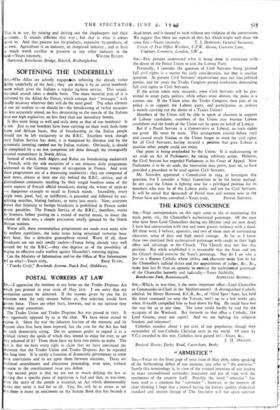POSTAL WORKERS AT LAW
a,—I appreciate the footnote to my letter on the Trades Disputes Act hich you .printed in your issue of May 21st. I am sorry that my ntention cannot be admitted. If the reasons given by you for its ection were the only reasons before us, that rejection would have reater force. There are other facts, however, and in my opinion they eaken your contention.
The Trades Union and Trades Disputes Act was passed in 1927. It as vigorously opposed by us at the time. We have never ceased to ppose it. Since the war the inherent fascism of the measure and its grant class bias have been exposed, but the case for the Act has had o such democratic airing. Do its sponsors prefer to regard it as a litical victory the spoils of which they intend to enjoy for ever, or are ey ashamed of it? From these facts we have two points to make. The t is that we have every right to claim that we have convinced the lectorate that the Trades Union and Trades Disputes Act be repealed is long time. It is surely a function of democratic government to sense ese convictions and to act upon them between elections. There are ontinual amendments and alterations proceeding, even now, without course to the constitutional issue you define Our second point is that we are not so much defying the law as ving that a specific piece of legislation is bad and that, in war-time, hen the unity of the people is essential, an Act which demonstrably
enies that unity is bad for us all. You, Sir, will be as aware as we at there is many an enactment on the Statute Book that has beconie a dead-letter, and is treated as such without any violation of the constitution. We suggest that there are aspects of this Act which might well share the
Clapham Common, London, S.W. 4.
Sut,—Few persons understand what is being done in connexion with the desire of the Postal Union to join the Labour Party.
Personally, I consider the question of Civil Servants being granted full civil rights is a matter for early consideration, but that is another question. At present Civil Servants' organisations may not join political parties, and for years the Trades Congress passed resolutions demanding full civil rights to Civil Servants.
If the action taken now succeeds, some Civil Servants will be per- mitted to enter party politics, while others must abstain, the point is a curious one. If the Union joins the Trades Congress, then part of its policy is to support the Labour party, and participation in politics is merely carrying out the duties of a Trades Union!
Members of the Union will be able to speak at elections in support of Labour candidates, members of the Union may become Labour candidates and the funds of the Union can be spent on behalf of Labour.'
But if a Postal Servant is a Conservative or Liberal, no such rights are given. He must be mute. This arrangement existed before 1927 and caused much friction as the Union forgot to work for civil rights for all Civil Servants, .having secured a position that gave Labour a position other people could not enjoy.
Ong point is being .overlooked by the Union. It is endeavouring to set aside an Act of Parliament, by- taking arbitrary action. Hitherto, the Civil Servant has regarded Parliament as his Court of Appeal. Now Parliament is to be set aside, the innovation may prove, later on, to have provided a precedent to be used against Civil Servants.
Mr. Snowden appointed a Commission in 1924 to investigate this question, but I consider a Select Committee to be the better method. In any case the Union is fighting now for a privileged position for its members who may be of the Labour party, and not for Civil Servants. It will be noted that thousands of Postal men and women now in the
Forces have not been consulted.—Yours truly, POSTAL SERVANT.


























 Previous page
Previous page